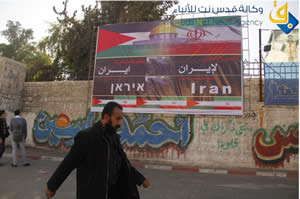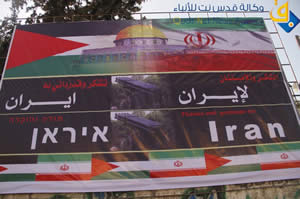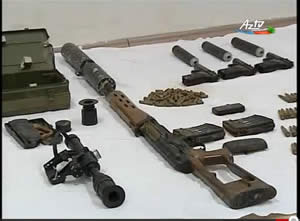Hezbollah has a 30-year history of terrorist activity in Lebanon, the Middle East and around the globe, directed against Israel, the Jewish people, the United States and the West, pro-Western Arab states and Hezbollah's enemies in Lebanon.
Overview
1. Since its establishment in Lebanon 30 years ago, Hezbollah has, without interruption, carried out or planned a variety of terrorist attacks around the globe, using different methods. Those terrorist attacks are part of Iranian policy, which uses Hezbollah as its main proxy through the Islamic Revolutionary Guards' Quds Force and other governmental institutions. The targets and emphases change from time to time according to Iranian and Hezbollah considerations and interests. The targets include Israel and the Jewish people, the United States and other Western countries, Hezbollah and Syria's opponents in Lebanon, and Arab regimes hostile to Iran and the "resistance camp" it leads.
2. In recent years Hezbollah has been involved in terrorist (an occasionally guerilla) activities in different arenas using various methods against its targets. At the same time, with Iranian and Syrian support, it has been upgrading its military-terrorist infrastructure in Lebanon, which far surpasses those of other terrorist organizations in the Middle East and beyond.
3. A short summary of Hezbollah's terrorist and guerilla activity and its military buildup follows.
1) In Lebanon Iran and Syria have enlarged and upgraded Hezbollah's military-terrorist infrastructure since the Second Lebanon War. Its main military asset is an arsenal of an estimated 60,000 rockets and missileswhich threaten Israel's civilians. Hassan Nasrallah, Hezbollah's leader, boasted that he had precise rockets and a bank of targets, and could turn the lives of hundreds of thousands of Israeli civilians into a living hell. Hezbollah also carries out personal terrorismagainst its opponents in Lebanon, mainly senior figures. The objective is to scare and deter Hezbollah's opponents, mainly after the erosion of its status following its support for the Syrian regime.
2) In the international arena, Hezbollah participates in the global terrorist campaign carried out by the Iranian Quds Force, whose main targets are Israeli diplomats and tourists. Hezbollah's most recent attack was on an Israeli tourist bus in Burgas, Bulgaria, considered successful (by Iran and Hezbollah), after a series of failed attacks abroad in previous years.
3) In the Palestinian arena, Hezbollah helped Iran upgrade the military-terrorist infrastructure of the terrorist organizations operating in the Gaza Strip after Operation Cast Lead, mainly Hamas and the Palestinian Islamic Jihad. On the eve of Operation Pillar of Defense the terrorist organizations had many thousands of rockets, among them long-range Fajr-5 rockets manufactured in Iran (eight of which hit or were intercepted in the greater Tel Aviv area). In addition, Hezbollah encourages terrorist attacks against Israel from the Gaza Strip and the Sinai Peninsula. During the Palestinian terrorist campaign known as the second intifada, Iran and Hezbollah provided the Palestinian terrorist organizations with financial and military support and handled terrorist squads in the Palestinian territories.
4) InsideIsrael Hezbollah carries out intelligence and subversive activities. Hezbollah, with Iranian aid, recently sent an unmanned aerial vehicle (UAV) to collect intelligence and to send Israel a deterrent message (UAVs could also be used for offensive purposes). Hezbollah also attempts to smuggle IEDs and weapons into for terrorist attacks (exploiting its ties to criminal networks) and to use Israeli Arabs for intelligence missions supporting its terrorist activities.
5) InSyria Hezbollah is part of the Iranian effort (led by the Quds Force) to prevent the topple of the Syrian regime, the central member of the so-called "resistance camp." Hezbollah provides the Assad regime with guidance, military training, intelligence and weapons, and hundreds of its operatives are present in Syria. In recent months several Hezbollah operatives died in the battles and others were taken prisoner by the rebels. However, Hezbollah does not admit to its military involvement in Syria and claimed that its operatives died while "fulfilling their commitment to jihad."
6) In the Arab states Iran uses Hezbollah for subversion, terrorism and guerilla activities: in Iraq Hezbollah operatives trained and handled the Shi'ite militias operated by the Quds Force against the United States and its allies (until America withdrew from Iraq at the end of 2011). In Yemen Hezbollah helped train the Iranian-supported Houthi rebels; and in Bahrain Hezbollah was recently publicly accused by Bahraini authorities of involvement in a series of explosions in the capital city of Manama. Its objective was to destabilize the Bahraini regime, against which Iran is waging a years-long campaign of terrorism and subversion. Hezbollah does not admit to involvement in terrorism and subversion in Arab countries.
The Structure of This Study
4. This study is the second part of comprehensive research into the terrorist and subversive activities Iran carries out around the globe directly, and though its main proxy, Hezbollah. The first part, which can be accessed on the Intelligence and Terrorism Information Center website,[1] deals with the Quds Force as spearheading Iran's global terrorism and subversion campaign during the last decade. Two additional parts, which will be issued in the future, will deal with the distribution (according to continent and country) of Iran's global terrorist activity and an analysis of the methods used by Iranian and terrorism and subversion.
5. The three appendices of this study providea chronological analysis of Hezbollah's most glaring terrorist activities in the 30 years since its founding, integral to Iran's overall policies.[2] In addition to terrorist attacks on civilians, Hezbollah has engaged in guerilla warfare in Lebanon and Iraq, against the IDF and against the United States and other Western armies. The targets have changed from time to time depending on Iranian policy, the constraints Hezbollah has had to deal with in Lebanon and the changing regional and international strategic circumstances during Hezbollah's 30 years of terrorist activity.
6. This study includes the following sections:
1) Hezbollah's place in the current global terrorist campaign against Israel.
2) Hezbollah's support for the Assad regime in Syria – update.
3) Summary of Hezbollah's record as a terrorist organization during the 30 years of its existence (1982-2012).
4) The issue of Hezbollah as a designated terrorist organization.
5)Three appendices dealing with the chronological distribution of Hezbollah's terrorist activities:
1) Appendix I: Hezbollah's terrorist activity, 2000-2012
A. Overview
B. The Lebanese arena
i) Building Hezbollah's rocket arsenal after the IDF left south Lebanon (2000-2006).
ii) Using the rocket arsenal to attack civilian targets in Israel during the Second Lebanon War.
iii) Updating the rocket arsenal after the Second Lebanon War (2006-2012)
iv) Employing terrorism and violence against Hezbollah's political opposition in Lebanon.
C. The Israeli arena
i) Overview.
ii) Sending a UAV into Israeli airspace.
iii) Using Israeli Arabs to collect intelligence.
iv) Using drug dealers to smuggle explosive devices into Israel territory.
D. The Palestinian arena
i) Iranian and Hezbollah (as a subcontractor) support for the Palestinian terrorist organizations operating in the Gaza Strip (2006-2012).
ii) Iranian and Hezbollah encouragement for Palestinian terrorism during the second intifada (2000-2005).
iii) Hezbollah's involvement in smuggling weapons from Iran for the Palestinian terrorist organizations during the second intifada.
E. The global arena
i) Hezbollah participation in the global wave of anti-Israel terrorism (2008-2012).
ii) Exposure of a Hezbollah network in Egypt which planned to carry out terrorist attacks (2008)
F. The Iraqi arena
i) The Quds Force's use of Hezbollah to support the Shi'ite militias against the United States and its allies (2006-2011)
ii) The affair of Ali Musa Daqduq
2) Appendix II: Hezbollah's terrorist activities during the 1990s
A. Overview
B. The global arena
i) Hezbollah's terrorist attacks in Argentina (1992, 1994).
ii) The failure of the attempted bombing of the Israeli embassy in Thailand (1994)
C. The Israeli arena
i) Terrorist attacks in Israel as well as in Gaza Strip, Judea and Samaria carried out through Europe.
ii) Terrorism and drugs: the abduction of Elhahan Tannenbaum (2000)
3) Appendix III: Hezbollah's terrorist activities during the 1980s
A. Overview
B. The Lebanese arena
i) Bombing the American embassy and American and French military barracks in Beirut(1983).
ii) Severe blow to the Lebanese branch of the CIA.
iii) Abduction of Western nationals.
iv) Assassination of Western and Jewish figures.
v) Epilogue
C. The international arena
i) Attacks on the American and French diplomatic missions in Kuwait (1983).
ii) Attempted assassination of the Kuwaiti emir (1985)
iii) Hijacking planes
a) TWA (1985)
b) Kuwaiti airplanes (1984, 1988)
c) Air France (1987)
d) Air Afrique (1987)
iv) Iranian and Hezbollah involvement in the wave of killings in Paris (1986-1987)
v) Prevention of terrorist activity in Germany (1987, 1989)
vi) Hezbollah network exposed in Spain (1989)
Hezbollah's Role in the Current Global Terrorist Campaign against Israel
7. For the past four years Hezbollah has participated actively in Iran's global terrorist campaign against Israel. The recent attack on an Israeli tourist bus in Burgas, Bulgaria, which killed five Israeli tourists and their local bus driver, was the first "successful" attack in the current terrorist campaign, after a series of attempted attacks were foiled. In the terrorist campaign conducted abroad, Hezbollah serves as an Iranian proxy handled by the Qods Force, an elite unit of the Islamic Revolutionary Guards (IRG), which spearheads Iran's foreign terrorism.[3] Even before the founding of the Qods Force, in the summer of 1982 the IRG established Hezbollah in Lebanon, and has provided it with massive military and financial support in the 30 years since.
8. Hezbollah's current targets for terrorist attacks are primarily Israeli diplomatic missions abroad and groups of Israelis on vacation throughout the Mediterranean basin and other tourist destinations. Some of the attacks and attempted attacks were carried out by Hezbollah, directed and supported by the Qods Force (Bulgaria, Cyprus, Azerbaijan and Turkey) and some were carried out by the Qods Force without Hezbollah involvement (Azerbaijan, India, Georgia, Thailand and Kenya).
9. The terrorist campaign, from the Iranian perspective, is a Iranian response to the "soft war"[4] being waged against Iran and the "resistance camp," and is also intended to strengthen Iran's strategic bargaining capabilitiesand show the United States, the West and Israel that it can harm their interests around the globe. As far as Iran and Hezbollah are concerned, the terrorist campaign is also a way of getting revenge for the death of senior Hezbollah commander Imad Mughniyeh and the killing of Iranian nuclear scientists (for both of which Iran and Hezbollah blame Israel), thusdeterring Israel from taking other actions, especially in its war against terrorism and the Iranian nuclear program.[5]
10. During the past four years (2008-2012) Hezbollah attempted to carry out six terrorist attacks, some of them in Mediterranean countries popular with Israeli tourists. One proceeded according to Hezbollah's plans and the others were either prevented or failed. In our assessment, they were carried out by Hezbollah's foreign operations unit (See below). The attacks were the following:
1) Blowing up an Israeli tourist bus in Bulgaria (July 18, 2012): An IED weighing about 3 kilos, or about 6.6 lbs, blew up the back of a tourist bus about to take Israeli tourists from the airport to their hotel in the Black Sea resort of Burgas. According to the Bulgarian minister of the interior, the IED had been assembled in Bulgaria. The terrorist attack was carried out by a Hezbollah operativewho, according to information from the Bulgarian authorities, had a local supporter who has not yet been detained. The terrorist was killed by a technical fault which caused the IED to explode prematurely. The blast killed five Israeli tourists, the Bulgarian bus driver and the terrorist. In addition, 36 Israeli civilians were wounded, three of them seriously.
2) Attack targeting Israeli tourists in Cyprus, prevented (July 7, 2012): The local authorities in Limassol detained a 24-year old Lebanese Hezbollah operative who was collecting information about Israeli tourists arriving on the island by air; he was carrying a Swedish passport (the Hezbollah terrorist operative involved in the attack in Thailand also carried a Swedish passport; see below). In our assessment, he was collecting information in preparation for an attack on Israeli tourists visiting the island, possibly the same sort of attack carried out in Bulgaria.
3) A terrorist attack on Israelis at a tourist center in Bangkok, Thailand (middle of January, 2012): Hezbollah, instructed by the Qods Force, attempted to attack sites visited by Israelis using IEDs. A Lebanese Hezbollah terrorist operative named Hussein Atris, carrying a Swedish and Lebanese passports, was detained at the Bangkok airport.[6] Another Hezbollah operative, also carrying a Swedish passport, managed to escape. Hussein Atris' interrogation led the police to a commercial building in Bangkok where they found a large quantity of chemicals used in the manufacture of explosives (about 4,400 kilograms, or 4.85 tons, of nitrogen and about 40 liters, or 10.5 gallons, of ammonium nitrate). In our assessment, the presence of such a large stock of potentially dangerous chemicals indicates the existence of a long-standing, well-established Hezbollah network in Thailand. A month later, on February 14, 2012, the Qods Force attempted another attack in Bangkok, this time using a magnet to attach an IED to the car of an Israeli diplomat. The attempt, like the Qods Force attacks in India and Georgia in the former Soviet Union, was prevented by the local authorities.
4) On January 5, 2012, the Israeli media reported that Hezbollah was planning to carry out terrorist attacks on Israeli tourists in Europe, especially Bulgaria. The Bulgarian news agencies also reported concerns about attacks on Israeli and/or Jewish targets in Bulgaria or Greece. On January 8 the Israeli media reported that a suspicious object had been found on a bus that entered Bulgaria from Turkey and was going to be used to transport Israeli tourists.
5) An unsuccessful attempt to assassinate the Israeli consul in Istanbul using an IED (May 26, 2011): The blast injured eight Turkish citizens. In July 2011 the Italian Corriere della Sera reported that three Hezbollah operatives from Beirut had often followed the Israeli consul from his home to the consulate. According to Sky News (April 2012), the Qods Force's Unit 400, responsible for attacks beyond the borders of Iran, was behind the attack. The attack was preceded, in 2009, by a joint Iran-Hezbollah attack on an Israeli target, and in 2010 by an Iranian attempt to attack an Israeli target, indicating Turkey as a favored location for Iran and Hezbollah's terrorist campaign.
6) An attempted attack on the Israeli embassy in Baku, Azerbaijan (May 2008): The attack was carried out by Hezbollah, in our assessment with support from the Qods Force. The terrorist cell was composed of two Hezbollah operatives, Ali Karaki, from Hezbollah's foreign operations unit, and Ali Najem al-Din, an explosives expert. The two underwent training in Iran before they were sent to Baku. They carried Iranian passports, and the Iranians also furnished them with a translator. Preparations for the attack, which had almost reached the final stage, were exposed when the Azeri security forces stopped a car carrying the two Hezbollah operatives. In the car they found guns with silencers, explosives, cameras, binoculars and pictures of the Israeli embassy. The two Hezbollah operatives were tried, found guilty, and sentenced to 15 years in prison (October 2009). During the first half of 2012 an attempted Qods Force assassination of two prominent Jewish figures in Baku was prevented. The attack was planned to be carried out during the Eurovision, without Hezbollah participation.
|
11. It is therefore evident that in recent years Hezbollah has been a close partner in Iran's global terrorist campaign, accelerating since May 2011. The campaign directly threatens all tourism, but its main targets are groups of Israeli tourists and Israel's diplomatic representatives around the globe. In our assessment, it reflects Iran and Hezbollah's readiness to expose themselves to risks, even at the price of a possible escalation with Israel. |
To the Full Document in PDF Format Click Here
[1] http://www.terrorism-info.org.il/Data/articles/Art_20378/E_137_12f_2140163071.pdf
[2] This study deals with terrorist activities which our information clearly links to Hezbollah or Iran-Hezbollah joint attacks. Hezbollah has carried out other terrorist activities but its involvement in them is either unknown or about which we do not have solid information, and they are not included here. Terrorist activities carried out by Iran without Hezbollah involvement are also not included.
[3] For further information about the Qods Force, see the August 7, 2012 ITIC bulletin "The Qods Force, an elite unit of the Iranian Revolutionary Guards, spearheads Iran's global terrorist campaign."
[4] According to Hezbollah leader Hassan Nasrallah, "today we are dealing with a different war, a soft war…and it is being waged by the United States, not only Israel (Al-Manar TV, Lebanon, July 25, 2012).
[5] Hassan Nasrallah publicly reiterated the threat of deterrence in his speeches. For example, on July 18, 2012, on the anniversary of the outbreak of the Second Lebanon War, he said that Hezbollah was deployed for a comprehensive war against Israel and that it would respond with a "great surprise" to any Israeli military strike.
[6] In the 1990s Hussein Atris married a Swedish woman and received a Swedish passport, which he used for his activities in Hezbollah's foreign operations unit.















































